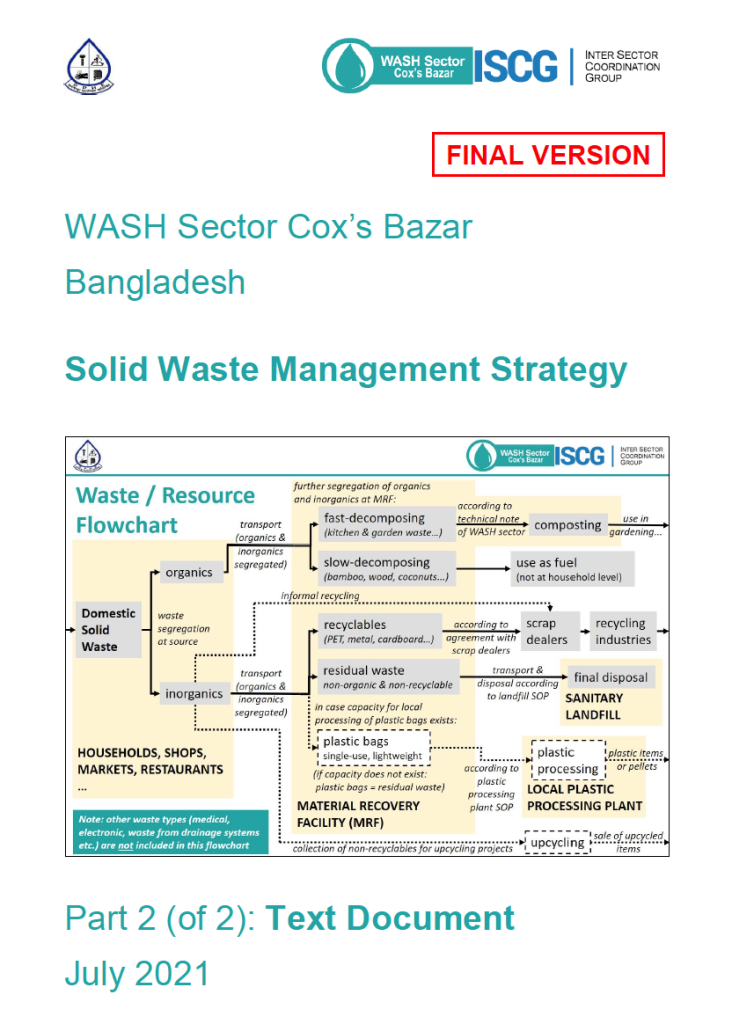Strategy
Solid Waste Management Strategy - Cox's Bazar, Bangladesh
Author: WASH Sector Cox's Bazar, Bangladesh
Year: 2021
In the Rohingya refugee camps in the Cox’s Bazar district in Bangladesh, SWM is imperative due to the high population density and the widespread use of individually wrapped and packaged commercial goods and distributed non-food items (NFIs), both of which generate a significant amount of waste. In 2020, SWM was voted the Number 1 thematic priority by the WASH Sector partner organisations.
The development of the SWM strategy was initiated by the WASH Sector and supported by the Swiss Agency for Development and Cooperation (SDC). Through field visits, stakeholder meetings, consultation workshops, reviews of literature and Bangladeshi directives, the content of this document was compiled in collaboration with and with the approval of various SWM actors. The SWM strategy will set out the needs and commitments by multiple sectors in unifying and synchronizing efforts for the safe handling of solid waste – an approach that is rather new in humanitarian responses, and for which humanitarian organizations still depend on clear guidance.
The content of this document provides all relevant information on “why” and “how” SWM should be implemented, including the core information on the establishment of a functional system for SWM, from (1) source segregation of waste to (2) collection and (3) transport of segregated fractions to (4) value recovery (for compostable, reusable and recyclable resources) to the eventual (5) safe disposal of the remaining waste. This approach is very much in line and based on Bangladesh’s “National 3R Strategy (Reduce – Reuse – Recycle) for Waste Management” from 2010.
While SWM comes under the WASH Sector’s responsibility within the humanitarian cluster approach, a joint approach by all sectors is needed to avoid the generation of waste whenever possible, and to make sure that all unavoidable waste is handled in a safe and systematic manner.
Rating
Would you like to see other resources here?
Give us your feedback"*" indicates required fields
Related Resources and Tools
UNHCR’s Waste to Value Sanitation Portfolio
Presentation at the Emergency Environmental Health Forum (EEHF) 2018 by Murray Burt, UNHCR, about waste-to-value…
Joint Operational Framework (JOF): WASH Resilience, Conflict Sensitivity and Peacebuilding
The “Joint Operational Framework: WASH Resilience, Conflict Sensitivity and Peacebuilding” aims to enable better collaboration…
Delivering Humanitarian Water, Sanitation and Hygiene (WASH) at Scale, Anywhere and Any Time
ROAD MAP FOR 2020–2025
Mobile Application for Digitized, Spatial Monitoring Of Desludging Operation in Rohingya Refugee Camps and Prediction Model for Proactive Scheduling, Analysis of Desludging Frequency, Latrine Containments & Operation of Resources
Video from the presentation at the Emergency Environmental Health Forum (EEHF) 2023 by Enamul Hoque,…
Wastewater Strategy for UNICEF-Lebanon
Presentation at the Emergency Environmental Health Forum (EEHF) 2018 by Ghada Zeidan, Gert de Bruijne,…
FSM Strategy for the Rohingya Response WASH Sector Cox's Bazar, Bangladesh
The Septic Bag Kit - safely managed sanitation in early stages of emergency relief
Presentation at the Emergency Environmental Health Forum (EEHF) 2019 by Thorsten Reckerzügl, BORDA.
UNHCR’s Waste to Value Sanitation Portfolio
Presentation at the Emergency Environmental Health Forum (EEHF) 2018 by Murray Burt, UNHCR, about waste-to-value…
Joint Operational Framework (JOF): WASH Resilience, Conflict Sensitivity and Peacebuilding
The “Joint Operational Framework: WASH Resilience, Conflict Sensitivity and Peacebuilding” aims to enable better collaboration…
Delivering Humanitarian Water, Sanitation and Hygiene (WASH) at Scale, Anywhere and Any Time
ROAD MAP FOR 2020–2025
Mobile Application for Digitized, Spatial Monitoring Of Desludging Operation in Rohingya Refugee Camps and Prediction Model for Proactive Scheduling, Analysis of Desludging Frequency, Latrine Containments & Operation of Resources
Video from the presentation at the Emergency Environmental Health Forum (EEHF) 2023 by Enamul Hoque,…
Wastewater Strategy for UNICEF-Lebanon
Presentation at the Emergency Environmental Health Forum (EEHF) 2018 by Ghada Zeidan, Gert de Bruijne,…
FSM Strategy for the Rohingya Response WASH Sector Cox's Bazar, Bangladesh
The Septic Bag Kit - safely managed sanitation in early stages of emergency relief
Presentation at the Emergency Environmental Health Forum (EEHF) 2019 by Thorsten Reckerzügl, BORDA.
Still have questions?
You could not find the information you were looking for? Please contact our helpdesk team of experts for direct and individual support.


